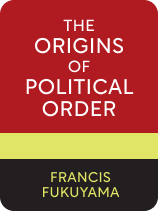

This article is an excerpt from the Shortform book guide to "The Origins of Political Order" by Francis Fukuyama. Shortform has the world's best summaries and analyses of books you should be reading.
Like this article? Sign up for a free trial here.
What difference did the Magna Carta make? Why was medieval England particularly disposed to democracy?
In the Middle Ages, England stood out from the rest of Europe. Political economist Francis Fukuyama discusses the Magna Carta, English society’s long-standing organization around local politics, and its emphasis on the legal system as the source of political legitimacy.
Keep reading for a brief history of democracy in England that shows how it was unlike any other nation of its time.
A History of Democracy in England
Of course, the history of democracy in England includes the Magna Carta, and Fukuyama explains how it contributed to government accountability. He also discusses two factors that led to English solidarity and democracy.
Because the feudal balance of power placed them in a relatively strong bargaining position, the land-owning classes eventually sought to solidify and expand their rights and constrain royal power by implementing state constitutions. Fukuyama points out that England, in particular, developed its sense of accountability in part from the Magna Carta, a charter of rights imposed on King John by a group of barons in 1215.
The Magna Carta helped establish the English Parliament as well as the idea that English monarchs had to respect the rights of those they ruled—it promised its protections to “all freemen of our kingdom,” not just to the barons who devised it. In other words, the implicit message of the Magna Carta was that the monarch had to answer to the English people as a whole—not just to one or two elite political classes.
| National Identity Encourages Political Solidarity One possible reason for England’s unusual political solidarity may have been the early emergence of an English national identity—that is, in order for the English barons to demand protection for all English people, they first had to be able to conceive of “the English people.” Though national identities seem ubiquitous today, in Imagined Communities, historian Benedict Anderson argues that nationalism is a comparatively recent concept—one that requires a shared cultural story that unites strangers from different communities and ethnic groups under a single national identity. But, whereas Anderson argues that national identity only emerged in the 18th and 19th centuries, more recent scholars contend that England, in particular, first developed its national self-identity between the 5th and 10th centuries. For example, these scholars point to The Venerable Bede’s The Ecclesiastical History of the English People (written around 731) as an early example of an English national mythology. In tracing the history of the English Christian church, Bede united a diverse collection of ethnic groups (such as Anglo-Saxons, Picts, and Gaels) under the single national label of “English.” Over time, this new national identity proved remarkably resilient. For instance, even after the Norman conquest of 1066, Norman rulers referred to themselves as kings of England, thereby legitimizing the idea of “the English” as a coherent people. By contrast, as Fukuyama notes, Hungary was invaded and colonized multiple times (by the Mongols in 1241 and the Ottomans in 1526) before eventually being absorbed into the dual monarchy of Austria-Hungary in 1867—a history that led to broad ethnic diversity but little sense of national identity. In fact, many scholars suggest that Hungarian national identity only truly emerged in the 20th century in response to Soviet rule and that ongoing attempts to forge such an identity are at the heart of Hungarian politics today. |
Factors Leading to English Democracy
Fukuyama points out that England’s political solidarity was unusual for this time period. As in 13th-century Hungary and 18th-century France, it was most common for individual social groups to seek their own gain (for example, via tax exemptions) at the expense of the rest of society. Fukuyama argues that England was different for two reasons: shire politics and law.
Factor #1: Shire Politics
Fukuyama says that, from the start of the Anglo-Saxon period around AD 450, England was organized around local politics (shires) rather than kin groups. Shires were nominally led by a hereditary local official called an ealdorman, but Fukuyama says that real power lay with a royally appointed sheriff (a word derived from the title “shire reeve”). When the Normans conquered England in 1066, they left this system in place, though they redesignated “shires” as “counties”—which are still the main political division in contemporary England.
Shires were unique in that they were structured from the bottom up (through the ealdorman) and from the top down (through the sheriff), which led to a balance of power between state and local interests and a sense that the state was accountable to the shires just as the shires were to the state. Fukuyama explains that shire politics were open to all free men (later all landowners), which gave commoners a significant political voice. At the same time, as a representative of the crown, the sheriff imposed state authority at the local level.
(Shortform note: This emphasis on local politics eventually worked its way into the national government. From 1264-1265, Simon de Montfort, the 6th Earl of Leicester, ruled England after deposing Henry III in a civil war. During that time, de Montfort called the first Parliament to include ordinary citizens from England’s cities and towns. After de Montfort’s downfall, Henry III’s son, Edward I, made this practice standard, ordering that each Parliament be made up of nobles, clergymen, two knights representing each county, and two elected representatives from each city and town. These early Parliaments became the foundation for the modern division of Parliament into the House of Lords and the House of Commons.)
Factor #2: English Law and Consent of the Governed
According to Fukuyama, England’s local politics most commonly revolved around laws and courts, and, as a result, English monarchs originally derived their legitimacy from their roles as legal arbiters. Fukuyama explains that, in the 11th century, kings traveled around the country to preside over royal courts of appeals where citizens unhappy with the decisions of local legal officials or lords could seek redress.
Fukuyama says, that under this system, the royal courts tended to support the property rights of non-elites seeking protection from noble abuses. By overturning local decisions, kings increased their prestige and demonstrated their authority over the noble courts. At the same time, they reinforced the rule of law and created strong popular support for the legal system.
| The English Understanding of Divine Right Though Fukuyama is right to emphasize the importance of the law in English political thought, early modern English theories of legitimacy appear to have been slightly more nuanced than his account suggests. In particular, Fukuyama’s theory of legal legitimacy stands in contrast to the theory of divine right, which posits that monarchs are anointed by God as his representatives on earth. Divine right suggests that monarchs derive their legitimacy directly from God, which supersedes any legal conceptions of legitimacy. While the theory of divine right held sway throughout 16th- to 18th-century Europe, it was first explicitly articulated by an English king, James I (who ruled England from 1603-25)—a fact that seems to contradict Fukuyama’s claim that England based political legitimacy on the law. On the other hand, whereas rulers like Louis XIV of France used divine right to justify absolutist monarchy—in which the monarch has unlimited, unquestionable power—early modern English political theorists accepted divine right, but still considered the monarch to be contained within the bounds of the English constitution, which they thought guaranteed good rule. For these English theorists, divine right had more to do with securing monarchs against rebellion (since it would be unlawful to overthrow God’s chosen official) than placing them above the law. |
Over time, Fukuyama says, the idea of legal legitimacy evolved into the notion that the state’s rule was legitimate only if it had the consent of those it governed. By the 13th century, Parliament essentially co-ruled with the monarch and generally saw their role as protecting all citizens from royal abuses, particularly when it came to taxation. In 1642, years of conflict between Parliament and Charles I erupted into the English Civil War, which ended in 1651 with Parliament’s victory and Charles’s execution.
After several more decades of strife, Fukuyama says, the principle of consent was finally cemented in the Glorious Revolution of 1688, in which England peacefully deposed James II in favor of William of Orange and Mary II. In essence, the Glorious Revolution established that England’s monarchs didn’t have an absolute right to rule—their authority depended on the approval of Parliament, and by extension, the people.
| Social Contract Theory as a Response to English Political Crisis In the mid-17th century, several English writers advanced a theory of government known as social contract theory—the idea that human society is based on an unspoken contract between the individual and the state. Social contract theory began with English philosopher Thomas Hobbes’s Leviathan (published in 1651, the last year of the English Civil War). Leviathan argues that a state is a mutual exchange in which citizens give up all of their rights in order to receive protection by an absolute ruler. Crucially, Hobbes rejected the idea of divine right, insisting instead that rulers are only legitimate if they uphold their end of the contract with their subjects. Several decades after Hobbes introduced social contract theory, another Englishman, John Locke, refined the theory in his Two Treatises of Government (published in 1689, at the tail end of the Glorious Revolution). Locke argues that a state’s purpose is to protect the public good and preserve citizens’ rights to life, liberty, and property. Unlike Hobbes, Locke rejects absolute government and insists that people retain individual rights under the social contract—including the right to overthrow a government that acts against the interests of its citizens. Throughout Origins, Fukuyama rejects social contract theory on the grounds that it fundamentally misconstrues human nature by incorrectly claiming that humans are naturally solitary (when, in fact, humans have always lived in groups, starting with kinship bands). But while social contract theory fails as an explanation for the origins of government, in the context of the English Civil War and the Glorious Revolution, we can usefully see it as a philosophical response to the political crises of the era. |

———End of Preview———
Like what you just read? Read the rest of the world's best book summary and analysis of Francis Fukuyama's "The Origins of Political Order" at Shortform.
Here's what you'll find in our full The Origins of Political Order summary:
- What modern democracy is and where it came from
- The three components a stable democratic society requires
- Three important takeaways from Fukuyama's book






